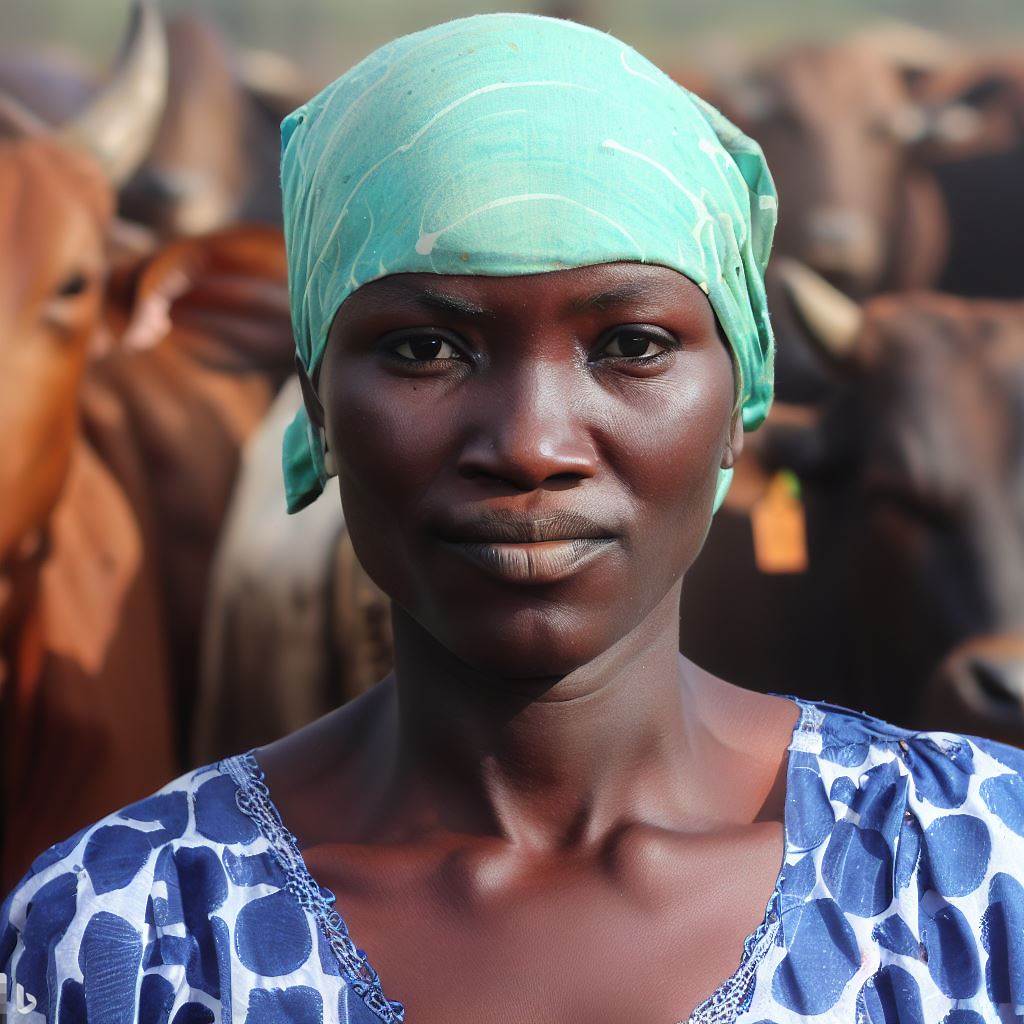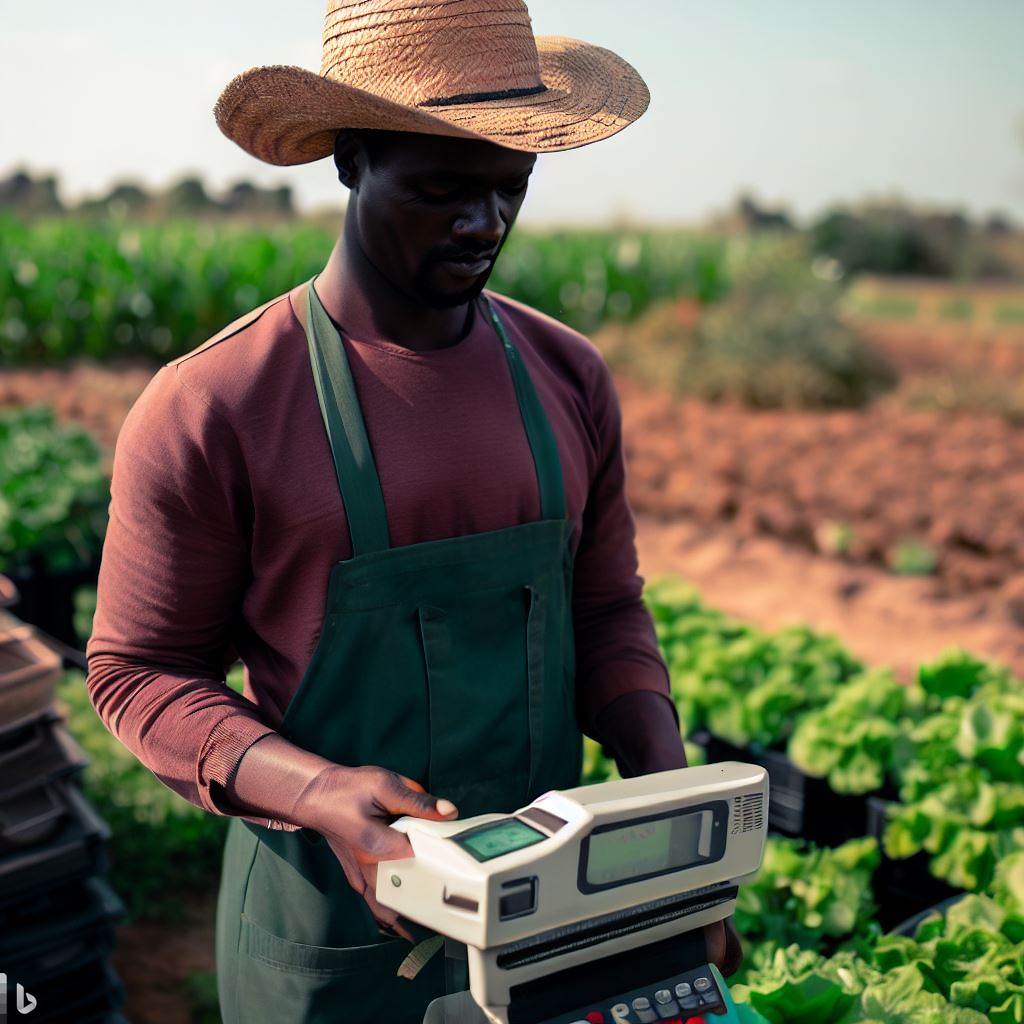Introduction
Importance of livestock industry in Nigeria
The livestock industry in Nigeria plays a vital role in the country’s economy, contributing significantly to employment and food security.
The livestock value chain encompasses all stages involved in the production, processing, and distribution of livestock and related products.
This blog post aims to provide an in-depth analysis of the livestock value chain in Nigeria, highlighting its importance, outlining its key components, and explaining the purpose of this blog post.
Livestock rearing is a crucial sector in Nigeria, providing livelihood opportunities for millions of people, particularly in rural areas.
The industry contributes to the country’s Gross Domestic Product (GDP) and serves as a significant source of income for many households.
Additionally, livestock products such as meat, milk, eggs, and leather are essential for domestic consumption and export.
Overview of livestock value chain
The livestock value chain in Nigeria consists of various interconnected stages, including breeding, production, marketing, and processing.
Each stage involves different actors, such as farmers, input suppliers, traders, transporters, and processors.
Understanding the dynamics and challenges of this value chain is crucial for enhancing productivity, improving market access, and fostering economic development.
Purpose of the blog post
The purpose of this blog post is to delve into the intricacies of the livestock value chain in Nigeria.
By examining each stage’s activities, actors, and constraints, readers will gain a comprehensive understanding of the industry’s functioning.
Furthermore, this analysis aims to shed light on the potential opportunities and interventions required to overcome existing challenges and enhance the sustainability and profitability of the livestock value chain.
Basically, the livestock industry in Nigeria is a crucial and multifaceted sector that contributes significantly to the economy and food security.
Understanding the livestock value chain’s intricacies is essential for improving productivity, market access, and livelihoods.
In the following sections, we will explore each stage of the value chain in detail, identifying key challenges and potential interventions. Stay tuned for the upcoming sections!
Livestock Production
Livestock play a crucial role in Nigeria’s economy, providing food, income, and employment opportunities for millions of people.
In this section, we will take an in-depth look at livestock production in Nigeria, including key livestock species, production systems, challenges faced, and government initiatives to support this sector.
Key Livestock Species in Nigeria
- Cattle: Cattle farming is one of the most prominent and lucrative livestock activities in Nigeria. The country is home to various breeds, including Zebu, Sokoto Gudali, and White Fulani, which are primarily raised for meat and milk production.
- Poultry: Poultry farming is another important livestock sector in Nigeria. The most common poultry species raised include chickens, turkeys, and ducks. Poultry farming is known for its high commercial value and affordability, making it accessible to small-scale farmers.
- Sheep and Goats: Sheep and goats are an integral part of Nigeria’s livestock value chain.They are reared for their meat, milk, and hides.Diversification into these smaller ruminants offers opportunities for increased income and improved food security in both rural and urban areas.
- Swine: Pig farming has gained traction in Nigeria over the years.Pigs are reared for their meat, which is highly nutritious and in high demand. The sector provides employment opportunities and has great potential for growth.
Livestock Production Systems in the Country
Traditional Extensive System
The traditional extensive system is prevalent in rural areas, where animals roam freely, graze on natural vegetation, and rely on natural sources for water.
It requires vast land and is characterized by low productivity.
Semi-Intensive System
The semi-intensive system combines elements of traditional and modern practices.
Livestock are partly allowed to graze while also being fed with improved fodder, supplements, and concentrates. This system offers better productivity and management.
Intensive System
The intensive system involves confining livestock in controlled environments, providing them with complete feed, water, and veterinary care.
It requires substantial infrastructure, capital investment, and knowledgeable husbandry practices. It ensures maximum productivity.
Challenges Faced in Livestock Production
- Inadequate Infrastructure: The lack of proper infrastructure, such as roads, electricity, and storage facilities, hinders the efficient production, processing, and marketing of livestock products.
- Disease Outbreaks: Livestock production in Nigeria is vulnerable to various diseases, including Newcastle disease, foot-and-mouth disease, and African swine fever. These diseases can result in significant economic losses and impact food security.
- Limited Access to Finance: Small-scale livestock farmers often face challenges in accessing financial services and credit facilities to expand their operations, purchase better breeds, or improve their infrastructure.
Government Initiatives to Support Livestock Production
- National Livestock Transformation Plan (NLTP): The NLTP aims to enhance livestock productivity, improve value addition, and promote peaceful coexistence between herders and farming communities. It focuses on promoting modern livestock practices and rural development initiatives.
- Livestock Feed Development Program: The government promotes the production and distribution of quality animal feed and supplements to improve animal nutrition, increase productivity, and reduce production costs.
- Veterinary Services: The government invests in veterinary services to control animal diseases and improve overall animal health. This includes vaccination campaigns, disease surveillance, and training of veterinary professionals.
- Capacity Building and Training: The government provides training programs and capacity building initiatives to equip farmers with the necessary skills and knowledge to enhance livestock production and management practices.
Generally, livestock production in Nigeria is vital for food security, income generation, and employment opportunities.
The country’s key livestock species, production systems, challenges, and government initiatives collectively shape the livestock value chain and contribute to the nation’s agricultural development.
Read: How Climate Change Affects Farm Management in Nigeria
Livestock Inputs
Livestock inputs play a crucial role in the overall development and success of the livestock value chain in Nigeria.
These inputs can be categorized into different sectors, including feed and forage, veterinary services and healthcare, breeding and genetics, equipment and infrastructure, and government interventions.
Feed and Forage
Feed and forage are vital components in the livestock industry, as they directly impact the health, growth, and productivity of animals.
To ensure proper nutrition, various feed options are available, including grass, grains, hay, silage, and concentrates.
Farmers need to ensure a balanced diet for their livestock, considering different animal species and their specific nutritional requirements.
Veterinary Services and Healthcare
Maintaining the health and welfare of livestock is crucial for the sustainability of the value chain.
Veterinary services and healthcare facilities are essential for disease prevention, early detection, and treatment.
Regular vaccinations, parasite control, and proper diagnosis and treatment of illnesses contribute to the overall productivity and quality of livestock.
Breeding and Genetics
Improving livestock genetics is crucial for enhancing productivity, disease resistance, and overall performance.
Breed selection, artificial insemination, and other assisted reproductive technologies can improve the quality of offspring, resulting in better growth rates, higher milk yield, and improved meat quality.
The availability of superior genetics and breeding programs facilitates the development of more profitable and sustainable livestock systems.
Equipment and Infrastructure
Livestock production requires appropriate infrastructure and equipment to manage housing, feeding, and waste management.
Adequate facilities such as barns, sheds, milking parlors, and handling chutes ensure the comfort and safety of livestock.
Equipment like milking machines, feeders, and water troughs also contribute to efficient production practices.
Government Interventions to Improve Livestock Inputs
The Nigerian government has recognized the importance of improving livestock inputs and has implemented various initiatives to support farmers and enhance the overall value chain.
These interventions include providing subsidies for the purchase of feed, veterinary drugs, and equipment, as well as creating awareness and training programs to educate farmers about modern livestock production practices.
In essence, livestock inputs are essential for the development and success of the livestock value chain in Nigeria.
From feed and forage to veterinary services, breeding, equipment, and government interventions, each component contributes to the overall growth, productivity, and sustainability of the industry.
By focusing on improving these inputs, Nigeria can further strengthen its livestock sector and contribute to the national economy.
Read: Farm Manager Training and Education Programs in Nigeria

Livestock Husbandry
When it comes to livestock husbandry in Nigeria, there are several crucial aspects to consider for the successful management of animals.
1. Animal housing and management
Providing appropriate housing facilities and effective management techniques play a vital role in the well-being and productivity of livestock.
Efficient animal housing and management ensure a comfortable living environment that promotes the physical and psychological well-being of the livestock.
It involves providing suitable shelters, adequate space, ventilation systems, and proper waste management techniques.
2. Animal nutrition and feeding practices
Ensuring a balanced and nutritious diet is essential for the optimal growth, development, and health of livestock.
Animal nutrition and feeding practices aim to meet the specific nutritional requirements of different livestock species, ensuring their optimal growth, productivity, and resistance to diseases.
This involves formulating balanced diets, providing clean and sufficient water, and managing feeding practices, including proper timing and feeding techniques.
3. Disease prevention and control
Implementing effective measures to prevent and control diseases is crucial to minimize losses and maintain the overall health of the livestock.
Disease prevention and control are crucial factors in livestock management.
It requires implementing biosecurity measures, regular vaccinations, quarantine protocols, and timely treatment of diseases and infections.
Furthermore, regular monitoring and surveillance help in early detection and control of any potential outbreaks.
4. Reproduction and breeding practices
Proper reproductive management and breeding practices are essential for maintaining a healthy and productive herd or flock.
Reproduction and breeding practices focus on improving the genetics of livestock populations.
This involves selecting superior breeding stock, implementing controlled mating programs, conducting routine reproductive examinations, and ensuring proper prenatal and postnatal care.
5. Farmer training and extension services
Providing comprehensive training and extension services to farmers is essential to disseminate knowledge and promote best practices in livestock husbandry.
Farmer training and extension services play a significant role in enhancing the knowledge and skills of livestock farmers.
It involves providing training programs, workshops, and demonstrations on various aspects of animal husbandry, including proper management practices, nutrition, disease prevention, and breeding techniques.
These services also provide farmers with access to the latest research findings and technology in the field.
In short, livestock husbandry in Nigeria requires attention to various critical factors such as animal housing and management, nutrition and feeding practices, disease prevention and control, reproduction and breeding practices, and farmer training and extension services.
Implementing best practices in these areas is essential for the sustainable and profitable management of livestock in the country.
Read: Fostering the Participation of Women in Farm Management in Nigeria
Livestock Marketing and Value Addition
Livestock markets and auctions
These markets provide a platform for buyers and sellers to trade animals, ensuring the flow of livestock from producers to consumers.
Value addition through processing and packaging
Value addition in the livestock sector is another crucial aspect.
Through processing and packaging, the value of livestock products can be enhanced, meeting consumer demands and preferences.
This can involve activities such as slaughtering, butchering, packaging, and even the production of value-added products like sausages and dairy products.
Export opportunities for Nigerian livestock products
The Nigerian livestock industry also offers export opportunities for various livestock products.
This presents an avenue for revenue generation and foreign exchange earnings. International markets have shown a growing demand for Nigerian livestock, particularly goats, cattle, and poultry products.
Proper coordination and adherence to export regulations are crucial to accessing these opportunities and ensuring product quality.
Quality and standards in livestock marketing and trade
The Livestock Value Chain in Nigeria hinges on upholding quality and standards to ensure consumer satisfaction and safety.
Vital steps encompass establishing and enforcing rigorous criteria for animal health, feed quality, transportation, and slaughtering practices.
Certifications like the National Agency for Food and Drug Administration and Control (NAFDAC) bolster confidence that livestock products meet safety and quality requisites.
Livestock markets and auctions function as vibrant trading hubs where buyers and sellers convene.
These dynamic marketplaces facilitate efficient transactions by uniting sellers showcasing their livestock with buyers who seek specific attributes like breed, age, and weight.
This ensures a diverse range of choices for consumers.
Enhancing value through processing and packaging is pivotal.
Hygienic slaughtering practices and animal welfare standards underpin processing.
Adequate butchering, packaging, labeling, and handling ensure consumer safety and appeal.
Nigeria’s livestock sector holds global export potential, driven by its resource abundance and favorable climate.
Capitalizing on this advantage hinges on meeting international norms, potentially catalyzing revenue and domestic employment opportunities.
To sustain high-quality standards and international compliance, stringent quality control measures must be implemented, covering animal health, feed composition, and transport conditions.
A traceability system can provide transparency, verifying livestock product origin and safety for consumers and global buyers alike.
Publish Your Professional Profile, Business or Brand
Showcase your expertise, gain trust, and boost visibility instantly on Professions.ng.
Publish NowIn sum, the Livestock Value Chain in Nigeria encompasses livestock markets, processing, packaging, export potential, and quality standards.
Elevating these facets fosters a robust sector, benefiting producers and consumers alike.
With stringent regulation and international adherence, Nigeria’s livestock products can compete globally, propelling economic growth and development.
Livestock Security and Food Safety
Livestock theft and security challenges
- Theft of livestock poses a significant challenge in Nigeria’s livestock value chain.
- Criminal activities include rustling, smuggling, and illegal sale of stolen livestock.
- Lack of proper security measures makes it easier for thieves to target livestock.
Measures to safeguard livestock and prevent theft:
- Encourage the use of identification methods such as branding, ear tagging, and microchipping.
- Improve the surveillance and monitoring system in livestock markets and transportation routes.
- Establish community-based security networks and engage local communities in protecting livestock.
Food safety regulations in the livestock value chain:
- The Nigerian government has implemented strict regulations to ensure food safety in the livestock sector.
- These regulations cover aspects such as animal health, welfare, hygiene, and traceability.
- Regular inspections and audits are conducted to ensure compliance with these regulations.
Importance of food safety in promoting livestock products:
- Food safety is crucial for public health as consuming contaminated livestock products can cause diseases.
- Adhering to food safety regulations enhances consumer confidence and promotes market demand for livestock products.
- Compliance with food safety standards improves the competitiveness of Nigerian livestock products in both local and international markets.
Ensuring livestock security and food safety is essential to the sustainability and growth of Nigeria’s livestock value chain.
Livestock theft not only causes financial losses to farmers but also disrupts the overall supply chain.
Implementing measures such as identification methods can deter thieves and help in recovering stolen livestock.
Additionally, strengthening surveillance and monitoring systems will enable authorities to identify and apprehend culprits involved in livestock theft.
Engaging local communities in protecting livestock can create a sense of ownership and responsibility, further enhancing security.
Food Safety Regulations
Food safety regulations play a critical role in ensuring that livestock products are safe for consumption.
The Nigerian government’s enforcement of these regulations ensures that livestock are kept in healthy conditions, minimizing the risk of disease transmission.
Regular inspections and audits guarantee that the value chain participants adhere to these standards.
By prioritizing food safety, Nigeria can build a strong reputation for producing safe and high-quality livestock products.
This, in turn, will increase consumer confidence, both domestically and internationally, driving market demand and creating economic opportunities for livestock farmers and processors.
All in all, livestock security and food safety are essential components of Nigeria’s livestock value chain.
Implementing effective measures to safeguard livestock from theft and enforcing food safety regulations will ensure the sector’s sustainability and promote the growth of livestock products in the market.
It is necessary to prioritize these aspects to protect public health, enhance market competitiveness, and contribute to the overall development of Nigeria’s livestock industry.
Read: Understanding the Role of a Farm Manager in Nigerian Agribusiness
Livestock Value Chain Finance and Investment Opportunities
In order to ensure the sustainable growth of the livestock value chain in Nigeria, access to finance plays a crucial role.
Livestock farmers require financial support to invest in their farms, improve their operations, and ultimately increase their productivity and profitability.
Access to Finance for Livestock Farmers
Livestock farmers face numerous challenges when it comes to accessing finance.
Traditional financial institutions often consider the livestock sector risky and are hesitant to provide loans to farmers.
Additionally, farmers lack the necessary collateral to secure loans from these institutions.
However, there are specialized financial institutions and schemes that aim to support livestock farmers with access to finance.
These institutions have a better understanding of the sector’s dynamics and provide products tailored to the specific needs of farmers.
Another innovative approach to finance for livestock farmers is through crowd-lending platforms.
These platforms connect farmers directly with individual lenders who are interested in supporting agriculture-related projects.
This provides an alternative financing option for farmers who may not qualify for traditional loans.
Investment Opportunities in Livestock Value Chain
The livestock value chain in Nigeria offers several investment opportunities for individuals and organizations interested in the sector. Some of these opportunities include:
- Establishment of feed mills and processing plants
- Investment in breeding and genetics programs
- Setting up of modern slaughterhouses and processing facilities
- Investment in technology and digital solutions for livestock management
- Development of agro-input supply chains
These investments have the potential to contribute significantly to the growth and development of the livestock sector, while also providing attractive returns on investment for the investors.
Government Schemes and Programs to Support Finance and Investment
The Nigerian government has recognized the importance of finance and investment in the livestock value chain and has introduced various schemes and programs to support farmers and investors.
These initiatives aim to address the financial challenges faced by farmers and promote private sector participation in the sector.
One such program is the Agricultural Credit Guarantee Scheme Fund, which provides guarantees to financial institutions that provide loans to farmers in the agricultural sector, including livestock farmers.
This helps reduce the risk for lenders and encourages them to provide loans to farmers.
Additionally, the government has established the Livestock Transformation Plan, which aims to attract private sector investments in the livestock sector through incentives such as tax breaks and access to land.
Partnerships and Collaborations for Financing the Livestock Value Chain
Partnerships and collaborations between different stakeholders are crucial for financing the livestock value chain in Nigeria.
These collaborations can include financial institutions, government agencies, farmers’ associations, and private investors.
By collaborating, stakeholders can pool resources, knowledge, and expertise to develop innovative financing models and support the growth of the sector.
For example, financial institutions can partner with farmers’ associations to provide loans specifically designed for livestock farmers, considering their unique requirements and risks.
Furthermore, partnerships between investors and agricultural technology companies can facilitate the development and deployment of technology solutions that improve productivity and efficiency in the livestock value chain.
In conclusion, access to finance and investment opportunities are crucial for the sustainable growth of the livestock value chain in Nigeria.
By addressing the challenges faced by farmers, promoting investment, and fostering partnerships, the sector can unlock its full potential and contribute significantly to the country’s agricultural development.
Conclusion
The livestock value chain in Nigeria is a crucial component of the country’s economy. It involves various stages, from animal production to the processing and distribution of livestock products.
Strengthening and supporting the livestock sector is of utmost importance. This sector not only contributes to food security but also generates employment opportunities and boosts economic growth.
Therefore, it is imperative for the government, stakeholders, and potential investors to take necessary actions to enhance the livestock value chain.
This can be done by providing financial support, improving infrastructure, implementing favorable policies, and promoting research and development.
By doing so, Nigeria can harness the full potential of the livestock sector, resulting in increased productivity, improved quality of livestock products, and enhanced market competitiveness.
It is time for everyone to recognize the significance of the livestock value chain and actively work towards its development and expansion.
Together, we can ensure a sustainable and prosperous future for Nigeria’s livestock sector.




